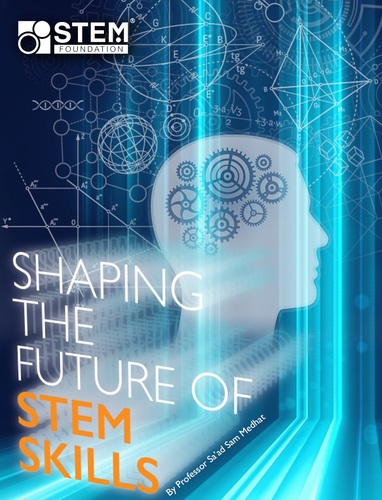Digital Skills Gap Widens, Employers Cite Situation Critical

The major stumbling block for companies wanting to unleash the power of the Industrial Internet is a lack of tech skills
The convergence of technology is changing the world as we understand it – Autonomy, the Internet of Things, Artificial Intelligence (AI), Data Visualisation and Mixed Mode Realities are creating new desires and needs never before imagined. They are disrupting the business world and transforming consumer experiences. Digital-centricity is the term that ties these new disruptors together. The huge reliance on ‘everything digital’ has placed massive demands on the job recruitment market, with companies fighting over getting the best digital talent. Despite this, some jobs such as those in data analytics or autonomy remain unfilled. Lack of education and skills in these key technologies is now critical and holding back companies wanting to grow.
A new research study – Shaping the Future of STEM Skills - by the STEM Foundation, and supported by the European Union’s Social Fund (ESF) in partnership with Greater Cambridge and Greater Peterborough (GCGP) Enterprise Partnership and the Association of Colleges in the Eastern Region (ACER) illustrates vividly a changing landscape of STEM (Science, Technology, Engineering and Mathematics) skills. Fuelled by fast growth technology disruptors, a seismic shift in the demand for technology education and skills is happening at a rapid pace. But the right technology education and skills. Currently, educational provision is not meeting employer needs. In over a hundred companies surveyed, over two thirds confirmed a 70% or higher business impact if they didn’t have skills in data analytics. A similar response was echoed by over half of all business respondents surveyed who stated an impact of 70% or more on their business if they couldn’t secure people with programming skills in Machine Learning, AI and Deep Learning. Business impact in these cases means sales revenue, market growth and profitability. The staples that keep business alive.
The Industrial Internet of Things has been cited as the fourth industrial revolution or Industry 4.0. STEM Foundation’s study identified over half of all respondents across ten business sectors cited an impact of 70% or higher by Industry 4.0, stating changes to their business models, processes and supply chains. Industry 4.0 boasts productivity increases and cost reductions to expensive manufacturing processes. The major stumbling block for companies wanting to unleash the power of the Industrial Internet is a lack of tech skills. Industry 4.0 requires data analytics, programming proficiency in R and Python, complex communications, data visualisation, problem-solving and large frame pattern recognition, however there is a significant gap in skills in all of these areas. The role of the Data Scientist, central to business analytics is growing fast. In the first half of 2016, the role of data scientist in companies grew by 32% (Computer Weekly, Aug 2016), and is predicted to grow by around 50% by the end of 2017 (Warwick Analytics, Mar 2017), but the supply of people with these skills doesn’t meet demand.
The study has discovered an on-going disconnect between what STEM courses are being taught by providers, and the needs of employers as determined by the pace of technology. And it is not just the pace of technology but the confluence of technologies that are forcing the need for a new set of multi-disciplinary technical skills. Although many sector-specific STEM programmes (such as Apprenticeships) have been created, they are often too specific, and through the volatility of a sector’s economics, have the potential of a shorter shelf-life and currency. The study advocates a need to assess the ‘intensity of demand’ for skills in new and emerging technologies; examining both market readiness and application base, so enabling STEM programmes to be repackages to offer key technology fundamentals (such as data analytics, sensors, connectivity and visualisation) thereby enabling students’ greater employment flexibility across a variety of different business and industry sectors.
The digital transformation and proliferation of AI, Automation and the Internet of Things is changing job profiles across a dramatically short time horizon. The study has shown a scarcity in the labour market for digitally proficient individuals with a higher functioning skills set. The study calls for a new type of Conversion Course that enables individuals to inter-operate in adjacent disciplines/sectors but still use their existing specialist technical skills and competencies to underpin their newly acquired knowledge. These are not simply ‘retraining’ courses, but technical programmes that build in the transferable skills that have been much cited by business leaders, and include: innovation, entrepreneurship, creativity, logic, visualisation, problem-solving and story-telling.
Contact Information
Study Author:
Professor Sa'ad Medhat, Chief Executive, STEM Foundation, saad.medhat@STEMFoundation.org.uk, www.STEMFoundation.org.uk, T: 020 8786 3677 M: 077 2028 6699
About STEM Foundation
The STEM Foundation (formerly the New Engineering Foundation) is an incorporated charity that was established by Professor Sa’ad Medhat in 2004 as an independent educational charity, professional body and “do-tank”. Guided by an Advisory Panel drawn from industry, academia and regulatory and policy agencies, the STEM Foundation supports improvements and innovations in Science, Technology, Engineering and Mathematics education by providing:
Continuous Professional Development (CPD)
Quality assurance in STEM related subjects
Innovation and STEM transformational strategies
Research and advocacy
Knowledge & Technology Exchange
The Foundation works closely with the Institute of Innovation and Knowledge Exchange (IKE) and engage with over 500 companies to help us shape and inform the future of STEM provision. The Foundation raised over 7M GB pounds over the years to support enhancements in STEM education, which have positively impacted over 600,000 students, 2500 lecturers and 250 educational providers.
This press release was distributed by ResponseSource Press Release Wire on behalf of STEM Foundation in the following categories: Education & Human Resources, Manufacturing, Engineering & Energy, Computing & Telecoms, for more information visit https://pressreleasewire.responsesource.com/about.